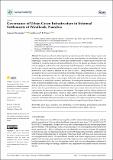Files in this item
Governance of urban green infrastructure in informal settlements of Windhoek, Namibia
Item metadata
| dc.contributor.author | Wijesinghe, Amayaa | |
| dc.contributor.author | Thorn, Jessica P.R. | |
| dc.date.accessioned | 2022-02-03T12:30:09Z | |
| dc.date.available | 2022-02-03T12:30:09Z | |
| dc.date.issued | 2021-08-10 | |
| dc.identifier | 277708966 | |
| dc.identifier | 1611d9b0-018a-47e8-9a42-dac67226f9cc | |
| dc.identifier | 85112492442 | |
| dc.identifier.citation | Wijesinghe , A & Thorn , J P R 2021 , ' Governance of urban green infrastructure in informal settlements of Windhoek, Namibia ' , Sustainability , vol. 13 , no. 16 , 8937 . https://doi.org/10.3390/su13168937 | en |
| dc.identifier.issn | 2071-1050 | |
| dc.identifier.other | RIS: urn:D1479F87308913CEF4F01DD8E99EF574 | |
| dc.identifier.other | ORCID: /0000-0003-2108-2554/work/117568928 | |
| dc.identifier.uri | https://hdl.handle.net/10023/24801 | |
| dc.description | Authors acknowledge funding from the School of Geography and the Environment, University of Oxford, and Linacre College, Oxford, and from UK Research and Innovation’s Global Challenges Research Fund (UKRI GCRF) through the Development Corridors Partnership project (project number: ES/P011500/1). This work was also supported through the African Women in Climate Change Science Fellowship of the African Institute of Mathematical Sciences and the Next Einstein Forum and the Climate Research for Development (CR4D) Postdoctoral Fellowship CR4D-19-21 implemented by the African Academy of Sciences (AAS) in partnership with the United Kingdom’s Department for International Development (DfID), the Weather and Climate Information Services for Africa (WISER) Programme, and the African Climate Policy Centre (ACPC) of the United Nations Economic Commission for Africa (UNECA). Statements made and views expressed in this work are solely the responsibility of the authors. | en |
| dc.description.abstract | Facing increased rural-urban migration, population growth, climate change impacts, and cascading natural, security, and health hazards, many municipalities in sub-Saharan Africa are beginning to consider the benefits of urban green infrastructure for improving the resilience and wellbeing of residents living in informal settlements. However, present governance systems are often ill-equipped to deliver the scale of planning needed. Integration of urban green infrastructure into local government mandates, spatial planning and targeted action plans remains limited, further inhibited by scarce empirical research on the topic in Africa. Taking Windhoek, Namibia, and specifically Moses ǁGaroëb, Samora Machel, and Tobias Hainyeko constituencies as a case study, we fitted key informant interview (n = 23), focus group (n = 20), and participant observation data into existing governance theory to investigate (a) benefits and trade-offs of present urban green infrastructure in Windhoek’s informal settlements; (b) urban green infrastructure governance in terms of institutional frameworks, actors and coalitions, resources, and processes; and (c) the key desirable pathways for future urban green infrastructure governance in informal settlements. To this end, we used five green infrastructure initiatives to dissect governance intricacies and found diverse opportunities for innovative governance mechanisms. The urgent need for climate resilience in Namibia offers a policy and practice window to adopt context-specific approaches for multifunctional urban green infrastructure. However, for these initiatives to succeed, collaborative governance platforms and clearly delineated mandates are necessary, with explicit integration of urban green infrastructure into strategies for in-situ informal settlements upgrading and green job growth. | |
| dc.format.extent | 25 | |
| dc.format.extent | 6590342 | |
| dc.language.iso | eng | |
| dc.relation.ispartof | Sustainability | en |
| dc.subject | Green space | en |
| dc.subject | Inclusive city | en |
| dc.subject | Informality | en |
| dc.subject | Local stewardship | en |
| dc.subject | Participation | en |
| dc.subject | Peri-urban settlements | en |
| dc.subject | Policy instruments | en |
| dc.subject | Right to the city | en |
| dc.subject | Self-governance | en |
| dc.subject | Sub-Saharan Africa | en |
| dc.subject | G Geography (General) | en |
| dc.subject | E-NDAS | en |
| dc.subject | SDG 11 - Sustainable Cities and Communities | en |
| dc.subject | SDG 13 - Climate Action | en |
| dc.subject.lcc | G1 | en |
| dc.title | Governance of urban green infrastructure in informal settlements of Windhoek, Namibia | en |
| dc.type | Journal article | en |
| dc.contributor.institution | University of St Andrews. School of Geography & Sustainable Development | en |
| dc.identifier.doi | 10.3390/su13168937 | |
| dc.description.status | Peer reviewed | en |
This item appears in the following Collection(s)
Items in the St Andrews Research Repository are protected by copyright, with all rights reserved, unless otherwise indicated.

